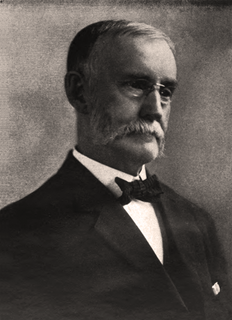A Quote by Henry David Thoreau
Let no one think that I do not love the old ministers. They were, probably, the best men in their generation, and they deserve that their biographies should fill the pages of the town histories. If I could but hear the "glad tidings" of which they tell, and which, perchance, they heard, I might write in a worthier strain than this.
Related Quotes
I'm really disturbed by the degree to which I don't hear people saying, "Are we leaving the world better than we found it?" I think we are a generation that perhaps could not answer in the affirmative, and it is the evasion of the larger responsibility of being only one generation in what one hopes will be an infinite series of fruitful generations. There is a selfishness in refusing to understand that we are passing through; others will come, and they deserve certain courtesies and certain considerations from us.
I'm no military expert, and these figures might not be exactly right,' I said. 'But as best I can tell, we've launched 114 Tomahawk cruise missiles into Afghanistan so far. Now take the cost of one of those missiles, tipped with a Raytheon guidance system, which I think is about $840,000. For that much money, you could build dozens of schools that could provide tens of thousands of students with a balanced, non extremist education over the course of a generation. Which do you think will make us more secure?
What other words, we may almost ask, are memorable and worthy to be repeated than those which love has inspired? It is wonderful that they were ever uttered. They are few and rare indeed, but, like a strain of music, they are incessantly repeated and modulated by the memory. All other words crumble off with the stucco which overlies the heart. We should not dare to repeat these now aloud. We are not competent to hear them at all times.
I did not write it [Coming of Age in Samoa] as a popular book, but only with the hope that it would be intelligible to those who might make the best use of its theme, that adolescence need not be the time of stress and strain which Western society made it; that growing up could be freer and easier and less complicated; and also that there were prices to pay for the very lack of complication I found in Samoa - less intensity, less individuality, less involvement with life.
A whole big, giant world full of men. Men with blue eyes. Brown eyes. Green eyes. And indescribable shades in between. Tall men. Short men. Skinny men. Built men. And all combinations thereof. Nice men (so I've heard, but never really seen). Mean men. Decent men, indecent. And who knows which is the best kind to have, to hold, to love? I'd say, with so many men in the world, it would pay to sample a few. Scratch that. More than a few. Lots and lots. And then a few more. And maybe, after years of research, you might find one worth not throwing back. But hey, the fun is in the fishing.
If the new Universal History were also read, it would give a connected idea of human affairs, so far as it goes, which should be followed by the best modern histories, particularly of our mother country; then of these colonies; which should be accompanied with observations on their rise, increase, use to Great Britain, encouragements and discouragements, the means to make them flourish, and secure their liberties.
Even in an advanced stage of civilization, there is always a tendency to prefer those parts of literature which favor ancient prejudices, rather than those which oppose them; and in cases where this tendency is very strong, the only effect of great learning will be to supply the materials which may corroborate old errors and confirm old superstitions. In our time such instances are not uncommon; and we frequently meet with men whose erudition ministers to their ignorance, and who, the more they read the less they know.
I write about the period 1933-42, and I read books written during those years: books by foreign correspondents of the time, histories of the time written contemporaneously or just afterwards, autobiographies and biographies of people who were there, present-day histories of the period, and novels written during those times.
I don't really listen to my old stuff, but on occasion, I would either hear a track on the radio or a friend might play me one, and there was generally a bit of an edgy sound to it, which was mainly due to the digital equipment that we were using, which was state of the art at the time - and I think everyone felt pressured to be working that way.
Spread the glad tidings that it will not disappoint Miss Heyer's many admirers. Judging from the letters I've received from obviously feeble-minded persons who do so wish I would write another These Old Shades, it ought to sell like hot cakes. I think myself I ought to be shot for writing such nonsense, but it's questionably good escapist literature and I think I should rather like it if I were sitting in an air-raid shelter, or recovering from flu. Its period detail is good; my husband says it's witty---and without going to these lengths, I will say that it is very good fun.
Men with fine gifts think it worth while to live to paint a few great pictures which shall be looked at and admired for generations; or to write a few songs which shall sing themselves into the ears and hearts of men. But the woman who makes a sweet, beautiful home, filling it with love and prayer and purity, is doing something better than anything else her hands could find to do beneath the skies.


































